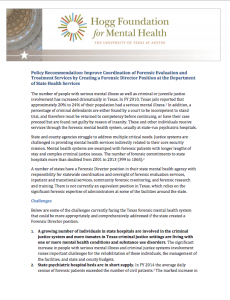Policy Recommendation: Improve Coordination of Forensic Evaluation and Treatment Services by Creating a Forensic Director Position at the Department of State Health Services
Overview
The number of people with serious mental illness as well as criminal or juvenile justice involvement has increased dramatically in Texas. In FY 2010, Texas jails reported that approximately 20% to 24% of their population had a serious mental illness.
In addition, a percentage of criminal defendants are either found by a court to be incompetent to stand trial, and therefore must be returned to competency before continuing, or have their case proceed but are found not guilty by reason of insanity. These and other individuals receive services through the forensic mental health system, usually at state-run psychiatric hospitals.
State and county agencies struggle to address multiple critical needs. Justice systems are challenged in providing mental health services indirectly related to their core security mission. Mental health systems are swamped with forensic patients with longer lengths of stay and complex criminal justice issues. The number of forensic commitments to state hospitals more than doubled from 2001 to 2013 (399 to 1065).
A number of states have a Forensic Director position in their state mental health agency with responsibility for statewide coordination and oversight of forensic evaluation services, inpatient and transitional services, community forensic monitoring, and forensic research and training. There is not currently an equivalent position in Texas, which relies on the significant forensic expertise of administrators at some of the facilities around the state.
Challenges
Below are some of the challenges currently facing the Texas forensic mental health system that could be more appropriately and comprehensively addressed if the state created a Forensic Director position.
- A growing number of individuals in state hospitals are involved in the criminal justice system and more inmates in Texas criminal justice settings are living with one or more mental health conditions and substance use disorders. The significant increase in people with serious mental illness and criminal justice systems involvement raises important challenges for the rehabilitation of these individuals, the management of the facilities, and state and county budgets.
- State psychiatric hospital beds are in short supply. In FY 2014 the average daily census of forensic patients exceeded the number of civil patients.
- The marked increase in inpatient forensic populations has heightened demands on state general revenue and limited the capacity of the state to treat individuals needing intensive mental health services through a civil commitment. Wait times for competency restoration services are growing. Due to limited psychiatric hospital beds, individuals determined to be incompetent to stand trial, typically due to mental illness or intellectual disability, often have significant wait times before receiving the appropriate mental health and restoration services. Other options such as diversion programs, outpatient competency restoration, jail-based restoration and more should be part of a coordinated effort to ensure that individuals do not have to wait extended periods for the needed services. These options are not currently coordinated and not all options are considered—or even known—in various judicial districts of the state.
- Interruption of mental health services for recently released inmates increases the risk for recidivism. Inmates who receive services while incarcerated may experience an interruption in services after their release that can interfere with their mental health and substance use disorder recovery. Transitional supports for inmates after prison or jail can be instrumental in reducing recidivism, but many inmates experience gaps in continuity of care, which could increase risk of re-incarceration.
- Weak cross agency/department coordination and duplication of services. Individuals with previous involvement in the criminal justice system may receive a number of services from state agencies such as TDCJ, TJJD, TEA, and DADS in addition to community-based services. A lack of care coordination can result in unnecessary expenditure, inaccurate medical and treatment information, and ineffective care.
Recommendation
The size and complexity of the forensic population served by DSHS has grown to the extent that a decentralized, localized approach no longer meets the need for efficient statewide and cross-agency coordination. Creating a position within the DSHS administration with responsibility for forensic evaluation services, inpatient and transitional services, community forensic monitoring, and forensic research and training would streamline forensic operations and accelerate the adoption of best practices in state facilities and local communities around the state.
Download the document (with footnotes).

